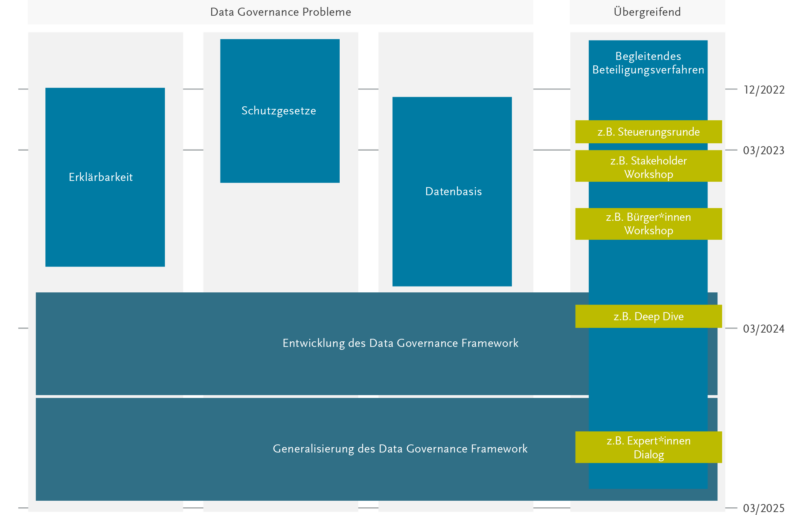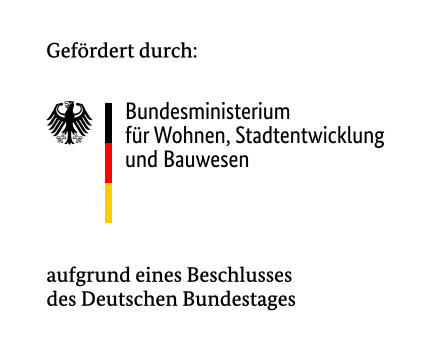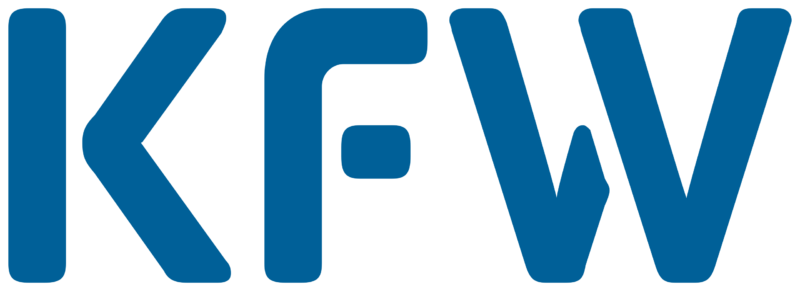
Data & Smart City Governance on the example of air quality management
Processes of rapid urbanisation pose immense challenges for for Berlin’s urban society. Here, the joint implementation of digital solutions to master challenges such as carbon neutrality, the mobility turnaround or the modernisation of administration raises pressing questions: Who is allowed to access which data for which purposes under which conditions? Which technologies are used to collect, file and process the data where and how? In which organisational structures or with which procedures are parameters for the processing of the data determined?
The aim of the project is to develop a data governance model that finds answers to these questions using a tool for monitoring air quality (air quality management) in urban areas as an example. The central question is: How can public administrations, economic actors and civil society cooperate on the topic of data use and processing in a way that is oriented towards the common good and on an equal footing?
“Data & Smart City Governance on the example of air quality management” is a pilot measure of the strategy Gemeinsam Digital: Berlin.
How do we understand data governance?
Data governance aims to balance conflicting interests in the collection and reuse of data. This concerns data sharing to generate new insights, to drive innovation or to connect people, be it personal data, business secrets or even open data. Possible conflicts can range from ensuring the provision of public services and safeguarding trade secrets to preventing surveillance and censorship up to protecting against exploitation, discrimination or political repression. Successful data governance thus aims to implement operational procedures in technical systems that protect the interests of all stakeholders and society as a whole.
To achieve this goal, a set of decision rules, criteria and indicators, processes, roles, responsibilities, and guidelines and standards need to be defined. All actors involved need to be coordinated on the technological, organizational as well as legal level. This coordination is summarized in a data governance concept.
In our project, the data governance concept is developed inductively (bottom up) on the previously mentioned use case of air quality management. Additionally, existing governance principles in the area of smart city as well as corporate and data governance are evaluated deductively (top down). As a result, a model for data governance in data-driven public services is generated that can be transferred beyond the specific use case to other municipalities and applied to further challenges of urbanization.
Participation process
In order to adequately address the complexity behind the issue of polluted air, we continuously involve stakeholders from politics, public administration, business and civil society throughout the project. In an iterative participation process, existing interests in the collection and processing of data are discussed to identify and defuse potential conflicts early on. The goal of the participation processes is to navigate between existing democratic processes, the responsibilities and design options of the administration, and the freedom rights of all actors involved.
Project process
In the first phase, the project focuses on various questions about the three identified data governance problems. The answers found will then result in the data governance framework. A more detailed version of our process can be downloaded below.

| Downloads | Workshop documentation:
Publications:
Other:
|
| Duration | 06/2022 – 03/2025 |
| Partner | The project coordination and research take place in cooperation with the Kompetenzzentrum Wasser Berlin: Nikolaus de Macedo Schäfer (Researcher)
|
| Funding | Funded by the Governing Mayor of Berlin – Senate Chancellery – with funds from the Federal Ministry for Housing, Urban Development and Building and the Kreditanstalt für Wiederaufbau (Reconstruction Loan Corporation) |



 Alexandra AuerResearcher: Data & Smart City Governance
Alexandra AuerResearcher: Data & Smart City Governance Luisa KruseResearcher: Data & Smart City Governance
Luisa KruseResearcher: Data & Smart City Governance Maurice StenzelResearch Coordinator: Data & Smart City Governance
Maurice StenzelResearch Coordinator: Data & Smart City Governance Maximilian von Grafenstein, Prof. Dr.Associated Researcher, Co-Head of Research Programme
Maximilian von Grafenstein, Prof. Dr.Associated Researcher, Co-Head of Research Programme
-
 Lea ReetzFormer Student Assistant: Data, Actors, Infrastructures
Lea ReetzFormer Student Assistant: Data, Actors, Infrastructures -
 Marcus Joseph Schweinberg, RAFormer researcher: Data, Actors, Infrastructures
Marcus Joseph Schweinberg, RAFormer researcher: Data, Actors, Infrastructures
Working paper
de Macedo Schäfer, N., Schweinberg, M. J., Stenzel, M., & von Grafenstein, M. (2023). Data Governance im Spannungsfeld datengetriebener Verwaltung. Herausforderungen von Kommunen bei der Etablierung einer Smart City Administration. HIIG Discussion Paper Series, 2023(4). DOI: 10.5281/zenodo.8297607 Publication details
Auer, A., von Grafenstein, M., Kruse, L. & de Macedo Schäfer, N. (2023). Öffentlichkeitsbeteiligung in der datengetriebenen Verwaltung. Ein prozessbezogener Ansatz zur Lösung datenbezogener Interessenkonflikte durch die Ergänzung formeller Beteiligung. HIIG Discussion Paper Series, 2023(5). DOI: 10.2139/ssrn.4603704 Publication details
Bria, F., Blankertz, A., Fernández-Monge, F., Gelhaar, J., Grafenstein, M. v., Haase, A., Kattel, R., Otto, B., Sagarra Pascual, O., & Rackow, L. (2023). Governing Urban Data for the Public Interest. The New Hanse Project Blueprint. Publication details
Lectures and presentations
Data & Smart City Governance am Beispiel von LuftgütemanagementSmart Country Convention. Digitalverband Bitkom, Messe Berlin. hub27, Messe Berlin, Berlin, Germany: 09.11.2023 Further information
Maurice Stenzel
Data & Smart City Governance – Datengetriebene Daseinsvorsorge gemeinwohlorientiert realisieren9. Zukunftskongress Staat & Verwaltung. Wegweiser Media & Conferences GmbH. WECC - Westhafen Event & Convention Center, Berlin, Germany: 19.06.2023 Further information
Alexandra Auer, Maurice Stenzel
Data and Smart City Governance. The importance of multi stakeholder processes and citizen participationJoint Master in Global Economic Governance & Public Affairs: Digitalisation for Sustainable Development. Centre International de Formation Européenne. Centre International de Formation Européenne, Berlin, Germany: 20.03.2023
Alexandra Auer, Lea Reetz
Organisation of events
Reallabor Bürger*innen-Beteiligung: Bessere Luft durch Verkehrswende?25.11.2023. CityLAB Berlin, Berlin, Germany (National) Further information
Luisa Kruse, Alexandra Auer, Maurice Stenzel, Maximilian von Grafenstein
Data Governance in Smart Cities in Post-COVID-19 Times24.10.2023. Humboldt Institute for Internet and Society, Berlin, Germany (International)
Jörg Pohle
Öffentlichkeitsbeteiligung in der dategentetriebenen Verwaltung23.10.2023. Humboldt Institut für Internet und Gesellschaft, Berlin, Germany (National)
Luisa Kruse, Alexandra Auer, Maurice Stenzel, Maximilian von Grafenstein
Expert*innen-Dialog: “Datenmodelle in der Verwaltungspraxis: Abwägungskriterien für Entscheidungsprozesse der datengetriebenen Verwaltung”08.09.2023. Humboldt Institut für Internet und Gesellschaft, Berlin, Germany (National) Further information
Maurice Stenzel
Digitaler Salon: Großbaustelle Daten. Byte für Byte zur Smart City28.06.2023. STATION Berlin, Berlin, Germany (National) Further information
Alexandra Auer, Maurice Stenzel
2. Steuerungsrunde “Data & Smart City Governance am Beispiel von Luftgütemanagement” / Gemeinsam Digital: Berlin08.06.2023. Humboldt Institut für Internet und Gesellschaft, Berlin, Germany (National)
Maurice Stenzel


